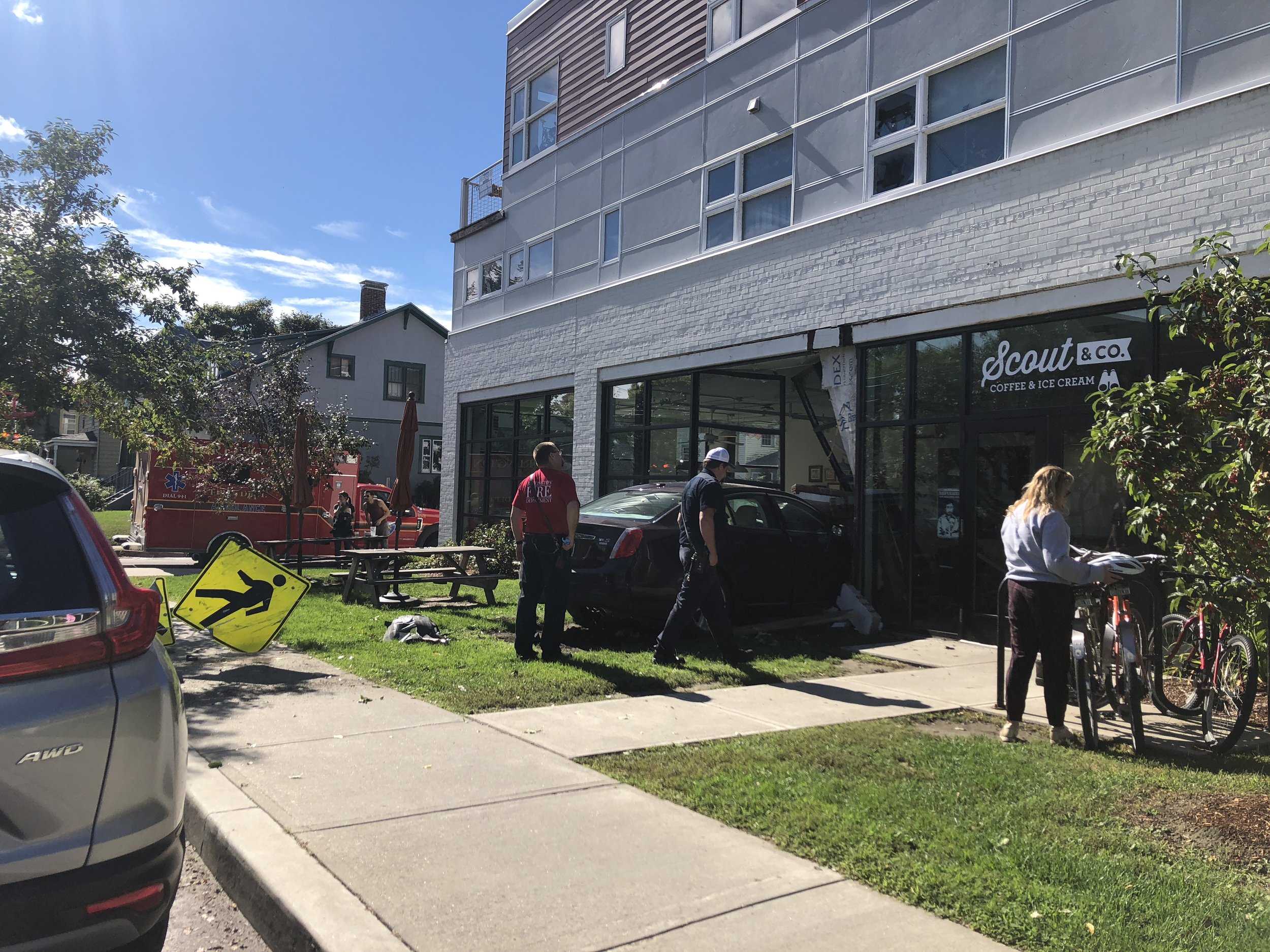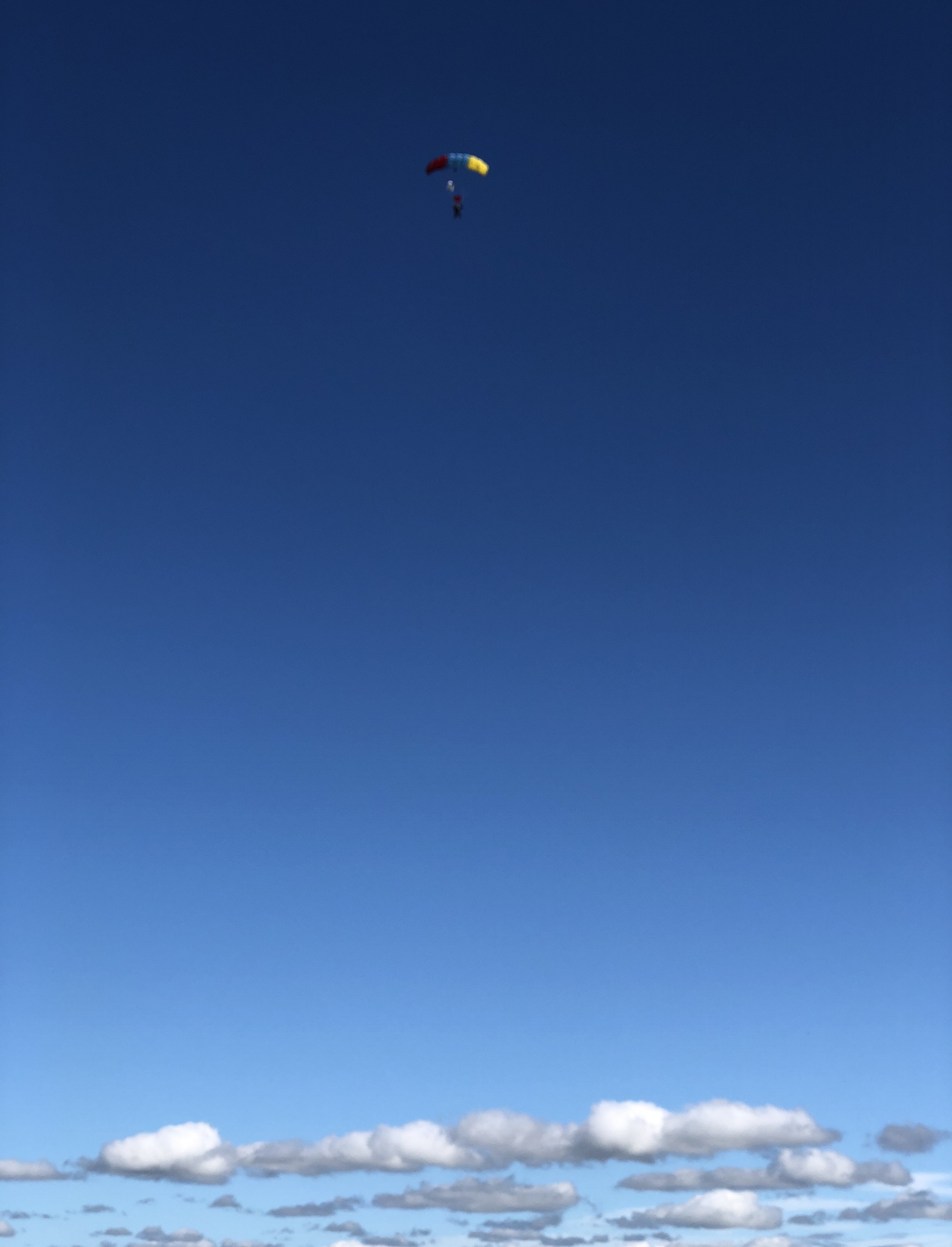Risk, Probability, Mortality
There is a trope that we fall back on when we seek justification for choices that might otherwise be odd, or even dangerous. “You can get hit by bus crossing the street,” the cliche goes, implying that the thing that feels familiar, normal and safe won’t necessarily ensure your security more that the thing that’s unusual, abnormal and risky.
And so it is that my experiences on a recent day can be summed up in two pictures:


One photo shows a car that crashed into a coffee shop where I had been logging long hours studying. The next photo, taken two hours later, shows a skydiver falling toward farm fields.
Allow me to explain.
I got to the coffee shop on a Friday morning around 8 a.m., telling myself that on that day I needed to focus. The previous day, Thursday, began with intentions to study and read, taking only short breaks to stretch, eat and check the news. But like every American (it seems), my day was obliterated from the moment I checked in on the Kavanaugh Supreme Court confirmation hearings. For the rest of the day — nine straight hours — I could not stop listening on the radio, watching on television, listening to a live stream on my phone, watching online. I moved through the day changing locations, occasionally multitasking; but the raw emotion of both his and her testimony was impossible to shut off, and the totally inadequate response of our paralyzed political processes stoked even more emotions. The day was exhausting; it sucked the air out of the room, and the time out of my schedule. I went to sleep thinking, fine. This horrible, historic day deserved the attention I gave it. But tomorrow— tomorrow I’ll get back to work.
And so on Friday morning I sat down at table near the big plate windows at Scout coffee shop and started to review my notes on a subject that’s vexed me: statistics and probability. It’s unlikely that I’ll need to answer a lot of questions on this topic, but the practice questions I had encountered were just beyond my basic knowledge. What are the chances of rolling a ‘three’ on a evenly weighted six-sided die? Easy. What is the mostly likely sum of two dice on any given roll? Slightly harder. (Seven, just FYI.) What are the chances that a car is about plow through the window into the spot where you are sitting?
Turns out, on that day, 100 percent.
So I was studying statistics. I was considering probability. And then I started taking a sample test, and it was not going well. I gave in easily to the light, seductive ‘ding’ of arriving text messages, and learned that my friend Jess is going skydiving that day at noon. She has thought about this years, planned to do it for sure THIS YEAR, and the drop zone in Vermont was staring down the final days of its season. That day was the day.
My thought pattern switched instantaneously from disciplined, stationary study-mode to HECK YES, LET’S GO SKYDIVING. Just the idea of it seemed to power wash the layers of ick from the day before, and the fog and slog of studying on the day after. The last year has clarified for me that I want one or both of two things: contact with foreign countries, and adventure. And sitting in a coffee shop in Vermont wasn’t hitting either mark.
It would take an hour to drive to the grass air strip in the middle of farm fields where we would sky dive. I could commit to studying a bit longer, then swing home to change clothes, and hit the road. Just at 11 a.m., I packed up my books, scanned my empty table to make sure I was leaving nothing behind, and walked out to my car. I drove a short distance up North Avenue to the house where I’m staying, hugged my cat, changed my shoes, and drove back down North Ave to head out of town.
Jess is one of those ‘if you’re not early you’re late’ kind of people, and so I was a little worried when the traffic on North Ave was stopped. Two cars ahead of me, I could see people gathering on the sidewalk, and police organizing themselves. The driver behind me had a line of sight that I didn’t and I could see the look of shock on her face as she pointed to something I couldn’t see. I got out to ask a cop, should the traffic just turn around, or— ?
And then I saw it. The rear end of a sedan, the gashes across the short lawn between the street and the coffee shop, the smashed wall of windows, and the front end of the car sitting roughly where I had been sitting eight minutes earlier.
What is the probability of that?
This is an equation that requires calculating several independent events. What are the chances that a man driving down the street has a heart attack and crashes into a coffee shop? What are the chances that Jess decides to go skydiving that day? What are the chances that I abandon my plans and decide to go with her, at precisely the time when that car was nearing my location?
What are the chances of that?
Exactly a month ago, I was on a ship in the Arctic that ran aground. After we were rescued, a coworker I didn’t know well asked me, why had I wanted to work in the Arctic? “Adventure,” I told him. “Well, you got that,” he answered dryly. As I packed up my books from the table that day, I was thinking to myself, life is all about choices. Responsible choices, daring choices. That morning, I chose to set aside all the “I should” inertia and completely change the trajectory of the day. Why was I doing this? Adventure. And a chance to shake off - literally and figuratively - so many corrosive thoughts and emotions.
I’m aware that sky-diving seems like a risky or even dangerous idea to some; I didn’t feel that way when Jess suggested it. I had done it before, years ago, and loved it, and always wanted to go again. But I agree that when presented with the question, which activity is more likely to be dangerous: sitting in a coffee shop, or skydiving? that the most likely answer, the one with the highest probability, is obvious. But on this particular day, that answer would be incorrect. What are the chances that skydiving would be the least dangerous choice I would make that day?
It’s not entirely a stretch, in fact, to say that skydiving, or Jess’s suggestion of it, saved my life. At the least it saved me from being severely maimed.
I do not dwell much on cosmic coincidences, nor I do believe everything happens for a reason, or that things are meant to be, or that someone is looking out for me. But I drove across the Vermont countryside knowing unmistakably that the impetuous, adventure-seeking choice I made that day saved me from the horrible consequences that would have come from continuing my mundane morning.
I drove to the skydiving drop zone full of adrenaline that morphed into affirmation as I took in the small airfield. Planes stay aloft in the sky. Parachutes open. Freefall is a controlled experiment in physics. All of this seemed incredibly obvious and safe and certain. As I signed away all my rights in a long legal contract, an experienced skydiver strolled through the office, his jumpsuit unzipped to the waist, revealing the back of his t-shirt:
“What could go wrong?” Indeed, what are the chances.